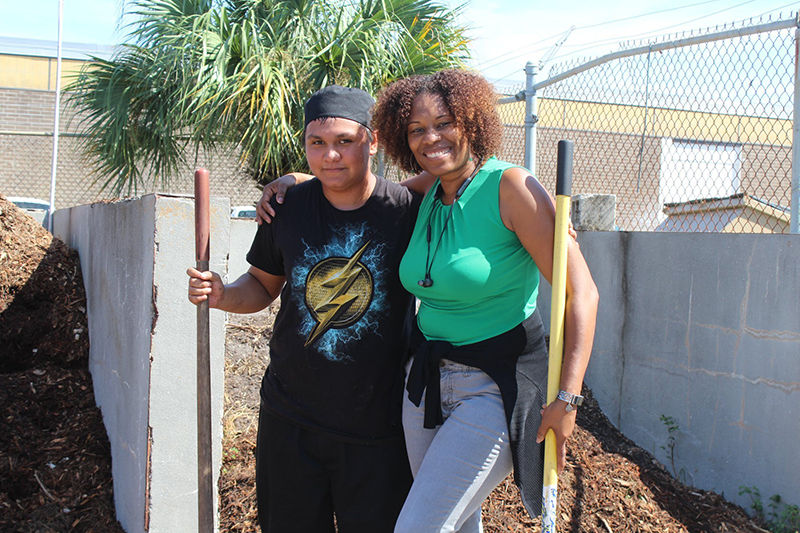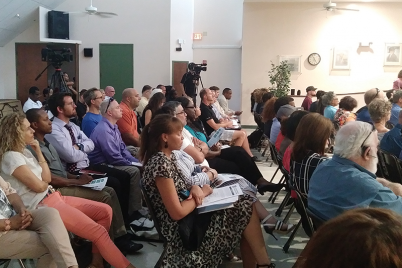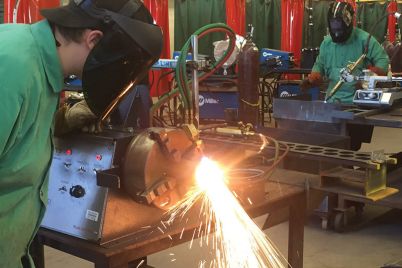Carla Bristol, seen here with a culinary student, heads up the Food System Center on the St. Pete campus of Pinellas Technical College.
BY FRANK DROUZAS, Staff Writer
ST. PETERSBURG — Quietly growing on the St. Petersburg campus of Pinellas Technical College (PTC) is a movement to end food insecurity by teaching sustainable gardening. The Food System Center is offering affordable, short courses to educate the public on how to grow their own produce.
First conceptualized back in 2016, the former horticulture facility ran by instructor Greg Charles fell flat after his passing. Previous program coordinator and facilities manager Nicole Brand mapped out a strategic plan for the space, and now the area is sprouting with activity.
The center’s short courses teach the public gardening skills such as growing healthy foods in the city and free composting classes for beginners. With the City of St. Petersburg offering free compost bins, there’s no cost to start returning valuable nutrients to the soil to help maintain soil quality and fertility.
“It’s really a wonderful way to start composting because it’s a good-sized container,” said Carla Bristol, who now oversees the Food Systems Center.
Various instructors will teach the courses such as Bill Bilodeau, owner of Earthsong Gardens. Currently, he’s teaching an urban farming class that covers topics such as creating fertile soil, harvesting and edible landscaping.
Courses can range from a few hours to eight-weeks long. The goal for the future is to offer more comprehensive training.
Bristol is a collaboration manager not only for the Food System Center at PTC but also for the Youth Farm, a collective impact partnership with the City of St. Petersburg, Foundation for a Healthy St. Pete, Pinellas County Schools and others.
Located behind the Enoch Davis Center and slated to open in the spring, the Youth Farm will teach young people gardening, irrigation, cooking and business skills.
Bristol said what the kids learn there can spark an interest in their parents about growing food — and they can, in turn, take courses themselves at PTC.
“At the Youth Farm, we’re dealing with young people, and we’re dealing with their families,” she said. “What if the young person comes home and says to mom or dad that they’re learning about growing healthy food, they’re learning about cooking? Where can the parent then go? So, the idea is the parent can then come here.”
The Youth Farm encompasses .83 acres of land and is still in the planning stages, but in the meantime, the youths can start growing food at the Food System Center.
“Let’s say they want to start a salsa business,” Bristol said. “Then Chef Corey and the school would support them in how to cultivate that product that they want people to try.”
Culinary arts instructor Corey Ryan came to PTC almost a year ago and immediately saw what his predecessors failed to see: the potential to incorporate the benefits of the property into the culinary program.
“My idea was to go farm-to-table,” Ryan said. “To teach that from the ground up; to teach them how to grow their own herbs and greens. Start with that and then get into more advanced gardening.”
Since Ryan’s arrival, all the organic food scraps used in the kitchen are not put into the trash, but into the compost piles on the property, he said, then covered with mulch in layers.
“Then we use the compost — we call it ‘black gold’ because it’s perfect as fertilizer — we put that into our garden beds,” Ryan explained.
The culinary students plant, grow and harvest produce to take back into the kitchen and prepare for the public.
Planting and growing food on the property is not actually on the curriculum, Ryan noted, but students do it on a volunteer basis. He expects the first crops of this season in less than two months.
Last year the garden yielded a variety of products such as kale, basil, peppers, beans, citrus and blueberries.
“It’s all organic out there,” Ryan pointed out. “We don’t use anything that’s chemically or synthetically made.”
Pests and critters can always pose a problem to any garden, but a healthy soil structure will lead to vigorous plants that are disease and pest resistant, Ryan said. The garden contains no chemicals, but neem oil is sprayed to help deter insects.
The Food System Center site is a certified farm, Bristol said, which allows the college to grow and sell food to the school system and provides food for local festivals as well.
Concerning food insecurity in certain areas of the city, Bristol feels that people should not have to go without fresh produce because there are no large grocery stores in their vicinity.
“The reality is that people will eat food that they grow. If you grow it, you’re likely to try it, you’re likely to eat it, you’re likely to cook with it, and you’re likely to tell other people to try it.”
Ryan said when it comes to plant propagation and growing your own food, there is indeed such a thing as a free lunch.
“If we can teach a kid that,” he said, “that’s such a freeing thing, a door for them to open, and they’ll do it for their whole life.”
Short and evening courses offered at PTC are high-quality courseware developed by instructors as short, continuing workforce development courses that provide a portion of the state-approved curriculum.
Due to the abbreviated nature, these courses do not articulate or grant credit toward Pinellas Technical College’s program level courses.
For more information on PTC and course offerings, visit myptc.edu.








